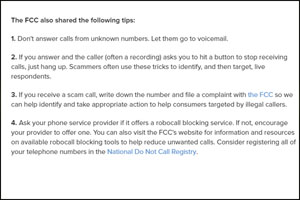Calling Scams
Threat through telephones- calling scams:
Scam call offering alluring vacation and prize:

Fake call on computer virus:

Bank loan scams:


Scam call for money claim:

Call back scams:
Call-back scams can be quite tricky. Scammers give a single ring and hang up, sparking your curiosity about who called and from where. If you return the call, these fraudsters seize the opportunity to quickly build rapport and extract your personal and financial information.
The best way to avoid such scams is to train yourself to end conversations if the call seems unnecessary or suspicious. This approach helps protect you from phone scams, which should always be taken seriously.

Calling scams often referred to as phone or telephone scams . It involve fraudsters using phone calls to deceive individuals or organizations into giving up money, personal information, or other assets as well. These scams take many forms and typically target unsuspecting victims. Below are some common types of calling scams and tips to protect yourself:
1. Impersonation Scams
-
These days, scammers are getting bold. Some call pretending to be from trusted agencies like the IRS or immigration services, demanding urgent payments or asking for personal information. Some may act like tech support, telling you there's something wrong with your device and offering to fix it, if you let them access your computer and pay a fee. Some even pretend to be police officers, warning that you could be arrested unless you pay a fine immediately. The key here is not to get panic. If you get a call like this, take a breath and don't act right away. Hang up, then check the details by contacting the agency directly using official contact numbers. It's always better to be safe than sorry.
2. Phishing Calls
You could get a call that seems to be from your Bank or Credit Card company, with someone politely asking for your Social Security number or Account details. They may sound completely legitimate, but don't be fooled. These scammers are pros at sounding trustworthy, and their only goal is to get their hands on your personal information. Never share your private details over the phone. If something feels wrong, hang up the call immediately. Then reach out to your Bank or Credit Card provider directly using the phone number on your card or their official website. It's always better to double check than regret it later.
3. Lottery and Prize Scams
Scammers will often claim you've won a lottery or a big prize, but there's a catch. Before you can collect your winnings, they say you need to pay taxes, processing fees, or any other charges. That's the red flag. If you didn't enter a contest, be suspicious. And even if you did, remember this, real sweepstakes or giveaways never ask you to pay anything upfront. If someone says otherwise, it's likely a scam.
4. Charity Scams
Fraudsters claim to represent charities and ask for donations, often during disasters or emergencies. Research the charity independently and donate only through verified websites or official contact methods.
5. Romance Scams
Scammers build fake romantic relationships over the phone, gain trust, and then ask for money often claiming emergencies. Be cautious in phone based relationships, especially if money is requested. Never send money to someone you haven't met in person.
6. Debt Collection Scams
Scammers threaten legal consequences or arrest if a supposed debt isn’t paid immediately. Request written verification of the debt and contact legitimate debt collectors to confirm any outstanding amounts.
7. Fake Sweepstakes and Contests
Victims are informed they’ve won a contest or sweepstakes, but must provide payment or personal info to claim the prize. Be wary of unsolicited contest notifications. Legitimate contests don’t require payment to claim winnings.
8. Investment Scams
Scammers offer fake investment opportunities promising high returns. Victims invest money but never see profits. Always verify investment opportunities. Consult a trusted financial advisor and conduct independent research.
